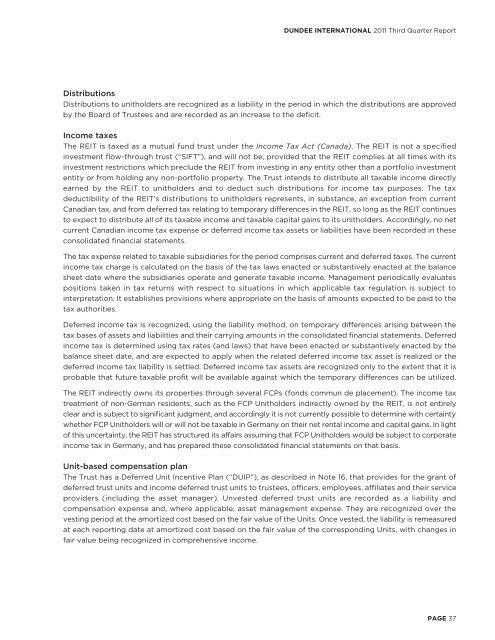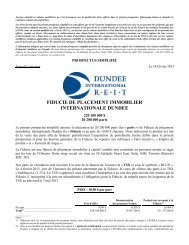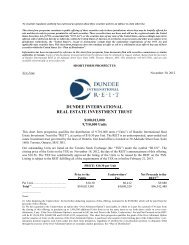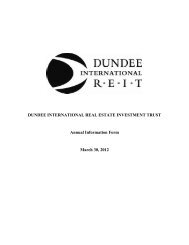DUNDEE INTERNATIONAL REIT
DUNDEE INTERNATIONAL REIT
DUNDEE INTERNATIONAL REIT
You also want an ePaper? Increase the reach of your titles
YUMPU automatically turns print PDFs into web optimized ePapers that Google loves.
<strong>DUNDEE</strong> <strong>INTERNATIONAL</strong> 2011 Third Quarter Report<br />
Distributions<br />
Distributions to unitholders are recognized as a liability in the period in which the distributions are approved<br />
by the Board of Trustees and are recorded as an increase to the deficit.<br />
Income taxes<br />
The <strong>REIT</strong> is taxed as a mutual fund trust under the Income Tax Act (Canada). The <strong>REIT</strong> is not a specified<br />
investment flow-through trust (“SIFT”), and will not be, provided that the <strong>REIT</strong> complies at all times with its<br />
investment restrictions which preclude the <strong>REIT</strong> from investing in any entity other than a portfolio investment<br />
entity or from holding any non-portfolio property. The Trust intends to distribute all taxable income directly<br />
earned by the <strong>REIT</strong> to unitholders and to deduct such distributions for income tax purposes. The tax<br />
deductibility of the <strong>REIT</strong>’s distributions to unitholders represents, in substance, an exception from current<br />
Canadian tax, and from deferred tax relating to temporary differences in the <strong>REIT</strong>, so long as the <strong>REIT</strong> continues<br />
to expect to distribute all of its taxable income and taxable capital gains to its unitholders. Accordingly, no net<br />
current Canadian income tax expense or deferred income tax assets or liabilities have been recorded in these<br />
consolidated financial statements.<br />
The tax expense related to taxable subsidiaries for the period comprises current and deferred taxes. The current<br />
income tax charge is calculated on the basis of the tax laws enacted or substantively enacted at the balance<br />
sheet date where the subsidiaries operate and generate taxable income. Management periodically evaluates<br />
positions taken in tax returns with respect to situations in which applicable tax regulation is subject to<br />
interpretation. It establishes provisions where appropriate on the basis of amounts expected to be paid to the<br />
tax authorities.<br />
Deferred income tax is recognized, using the liability method, on temporary differences arising between the<br />
tax bases of assets and liabilities and their carrying amounts in the consolidated financial statements. Deferred<br />
income tax is determined using tax rates (and laws) that have been enacted or substantively enacted by the<br />
balance sheet date, and are expected to apply when the related deferred income tax asset is realized or the<br />
deferred income tax liability is settled. Deferred income tax assets are recognized only to the extent that it is<br />
probable that future taxable profit will be available against which the temporary differences can be utilized.<br />
The <strong>REIT</strong> indirectly owns its properties through several FCPs (fonds commun de placement). The income tax<br />
treatment of non-German residents, such as the FCP Unitholders indirectly owned by the <strong>REIT</strong>, is not entirely<br />
clear and is subject to significant judgment, and accordingly it is not currently possible to determine with certainty<br />
whether FCP Unitholders will or will not be taxable in Germany on their net rental income and capital gains. In light<br />
of this uncertainty, the <strong>REIT</strong> has structured its affairs assuming that FCP Unitholders would be subject to corporate<br />
income tax in Germany, and has prepared these consolidated financial statements on that basis.<br />
Unit-based compensation plan<br />
The Trust has a Deferred Unit Incentive Plan (“DUIP”), as described in Note 16, that provides for the grant of<br />
deferred trust units and income deferred trust units to trustees, officers, employees, affiliates and their service<br />
providers (including the asset manager). Unvested deferred trust units are recorded as a liability and<br />
compensation expense and, where applicable, asset management expense. They are recognized over the<br />
vesting period at the amortized cost based on the fair value of the Units. Once vested, the liability is remeasured<br />
at each reporting date at amortized cost based on the fair value of the corresponding Units, with changes in<br />
fair value being recognized in comprehensive income.<br />
PAGE 37






